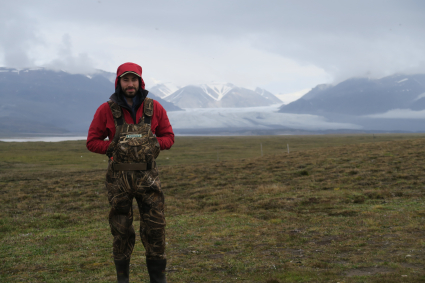Vincent Laderriere
Ph.D. in water sciences, 2022
Researcher in soil ecology at Centre national de recherche scientifique (CNRS France)
“You have to take advantage of what I call the right to wander. Studying is an opportunity. Even more so in an environment like INRS where many scientific disciplines come together.”
As part of his studies in ecophysiology and ecotoxicology at the Université Pierre et Marie Curie (Sorbonne University), Vincent Laderriere completed two internships at INRS in the team of Professor Claude Fortin of the Centre Eau Terre Environnement research and training centre. Vincent was quickly compelled by INRS’s multidisciplinary approach and decided to pursue research under the supervision of Professor Fortin. The latter offered Vincent the possibility of an accelerated passage to a doctorate, which allowed him to substantially deepen his research work and to develop academic collaborations both locally and internationally. These even led him to work in the Canadian Arctic and Nunavik.
The transdisciplinary philosophy of INRS, which was encouraged at the Centre Eau Terre Environnement centre, immediately appealed to Vincent. “It’s a small university. This can be seen as a weakness for some people, but for me it is a strength. Every day, you meet scientists or people working in fields that are not necessarily yours, at the corner of a corridor or a common area. This makes it an extremely fertile ground for building a scientific culture and arousing personal interests for one’s life or future career. Interests that are not necessarily the same as those for which you initially came to INRS. Vincent himself was working on the biogeochemistry of metals when he had the opportunity, through exchanges with other researchers, to work on subjects such as microbial ecology, pergelisol melting and greenhouse gas emissions at the Bylot Island research station (Nunavut). “These stays allowed me to gravitate and work on things that were not necessarily related to my research project but built me up as a scientist by giving me unforgettable moments. I consider myself extremely lucky.”
Vincent also has fond memories of the lunch breaks in the common area of the Centre Eau Terre Environnement centre, where most students and staff meet at lunchtime. A unique and friendly atmosphere, he says. “You truly live with the community. I love it there.”
As for his experience at INRS, Vincent adds: “I was in water sciences and I worked in environmental chemistry and I had the opportunity to go to extreme environments, if you like, sheltered from human activities, as well as to places that are very heavily impacted and really put under pressure by human activities. The lesson I have learned is that in the environment, nothing is fixed, and everything is linked. You must develop a holistic approach. Every detail can be important and it's a real treasure hunt. Of course, the answers from fieldwork are not as clear as the results obtained in a laboratory. This forces you to take everything into account and to try to play with the parameters in a more global way. Nothing is ever as clear or simple as we think. Through the interplay of interdependencies, we can draw conclusions. Everything depends on everything.”
Vincent is currently a researcher in soil ecology at the Centre national de recherche scientifique (CNRS) in France, one of the world’s leading research institutions and recognised for the excellence of its scientific work. In collaboration with the University of Lorraine, his work focuses on the health of soils that are contaminated with metals by looking at the communities of bacteria and invertebrates in the soil. “I link this to the functions that are necessary for the ecosystem to function properly. The ultimate goal of the project would be the creation of an ecological soil diagnostic tool that will allow us to measure whether the ecosystem has its functions disrupted by human activities in all kinds of contexts.”
Vincent’s aspirations and wishes are to continue contributing to the development of new knowledge. He ends our interview with this advice: “You have to take advantage of what I call the right to wander. Studying is an opportunity. Even more so in an environment like INRS, where many scientific disciplines come together. Research is sometimes done too much in silos. Studying is an incredible opportunity to be curious about concepts, disciplines, and people. Nothing is written yet. And if I compare it to my background, I’m a microbiologist who finally got a PhD on the biogeochemistry of metals. And why not? You must remain open to opportunities that open spontaneously in the course of your higher education and perhaps even more so, to those that go beyond the scope of your disciplinary studies, because these opportunities open doors to other spheres. My wish is to continue with what I have already learned at INRS. I continue to work for the long term. For the future and for the knowledge of our ecosystems. There is less and less room for wildlife and it must be preserved. I want to be one of the scientists who know how to say what they think to move in the right direction.”
[As interviewed in March 2023.]

